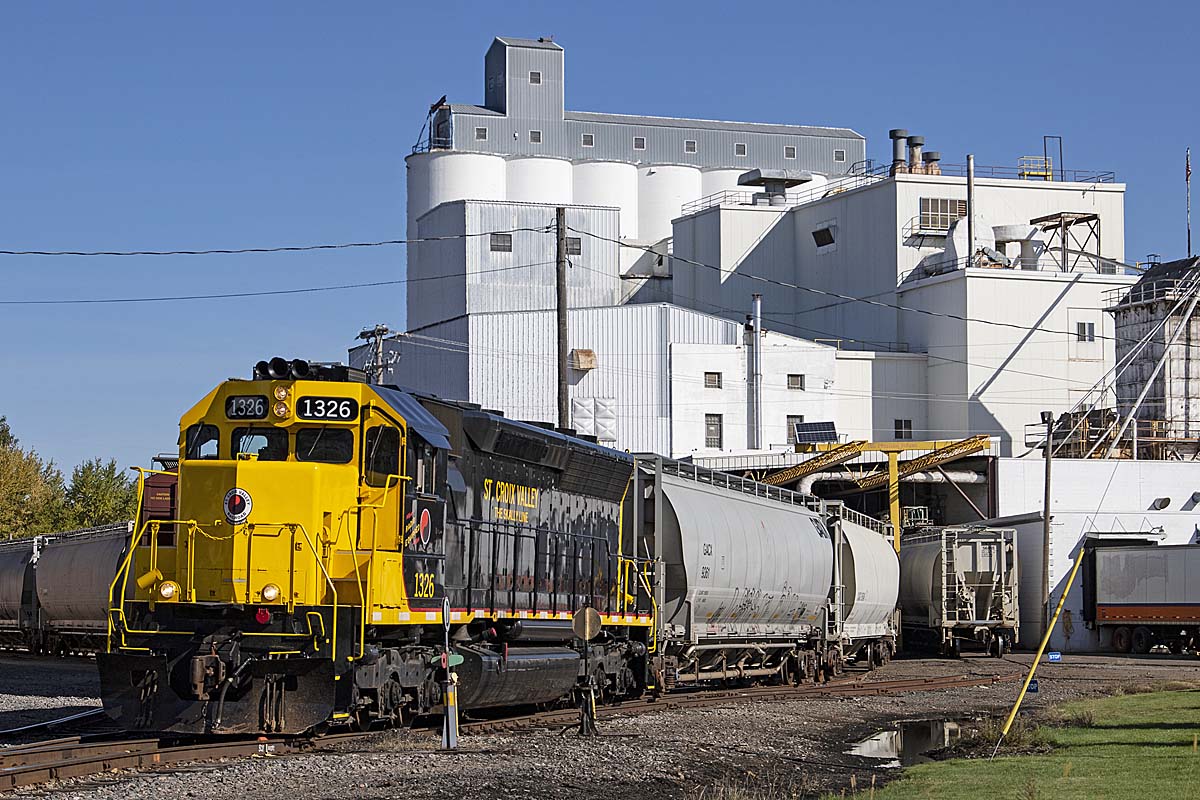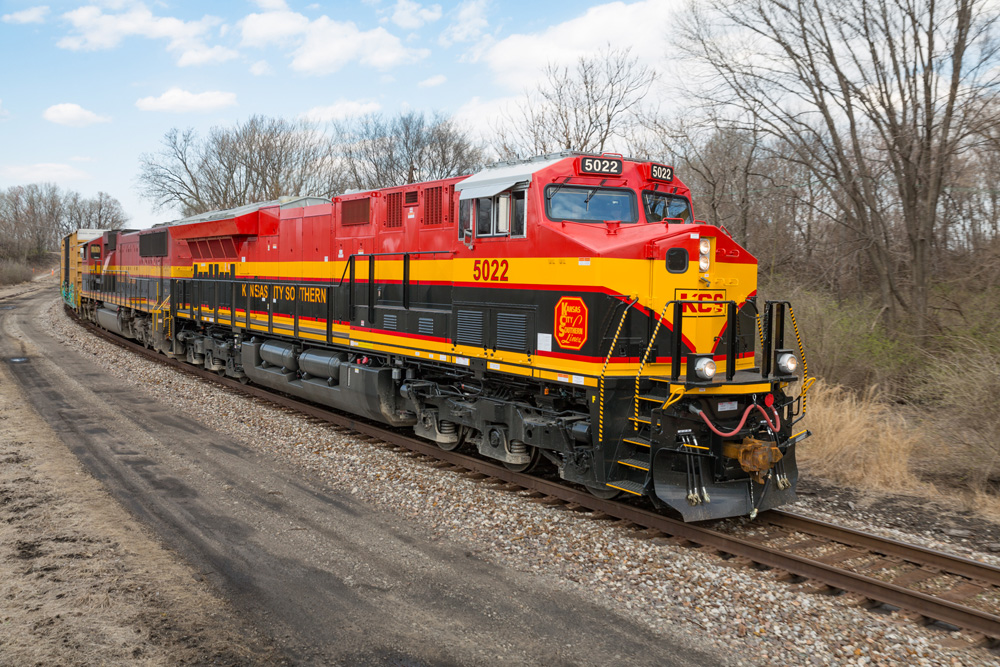Earlier this year Ardent Mills LLC announced that it would permanently close its flour mill in Rush City in February 2020. The facility will then be torn down to assure no competitor purchases it. The Rush City mill principally grinds spring wheat and durum, the latter is used is used to make pasta. The railroad brings in about 1,200 to 1,800 carloads of wheat each year to the Rush City mill and hauls out flour, much of it destined for Kraft Foods for its pastas. But come February 2020, that traffic will disappear.
The Rush City mill has a long history. It was the first mill acquired by Farmers’ Union Grain Terminal Association, a predecessor cooperative to CHS Inc. The mill was built in 1910 and converted to a durum mill in 1926.
That still leaves the railroad with its biggest customer: the Titan Lansing sand plant in North Branch. The railroad receives empties from BNSF Railway at Hinckley and takes loaded sand trains back for interchange. The plant opened in 2013 with sand trucked from Grantsburg, Wis. With the current downturn in the frac sand business, carloads from the plant have slowed to a trickle. While there have been persistent rumors about the plant closing permanently, the company has not announced any plans to do so and the railroad has not received any information about a permanent closure.
With sand traffic greatly reduced, the only remaining customers after Ardent Mills closes would be Interstate Energy Partner’s propane facility in Rush City and Zinpro Corp. at North Branch, which produces animal nutrition products and receives about 100 cars of chemicals a year. Whether the railroad could hang on with that traffic and minimal sand shipments until it can land more business is an open question.
St. Croix Valley currently has three locomotives painted in a quasi-Northern Pacific scheme: GP9 1363 and two SD40-2s rebuilt from SD45s but retaining their original carbodies, Nos. 1325-1326. Another NP-painted locomotive, GP8 No. 1352 has mechanical issues and is off the property.
NP’s “Skally” line was downgraded following the BN merger, with most traffic moving on the former Great Northern between the Twin Cities and the Twin Ports. BN began abandoning portions of the line in mid-1970s north of Hinckley; the route south of North Branch was cut in 1989. St. Croix Valley began operations in 1997 under the aegis of RailAmerica; in 2000 it was sold to KBN Inc., which also owns short lines Dakota Northern and Minnesota Northern.















some years back, a battery plant was being closed and the machinery shipped to the ChiComs. A rumor leaked out that a soon -to-be-unemployed electrician came back after hours & rewired the machines to burn up when initially restarted. Chris ,what you stated will NOT happen. THE former R.R. Donnelley plant in Va. closed in May & the company scrapped every machine in the place. (All were functioning the day the shut down).
That’s so sad.
More good paying blue collar jobs gone. Hope someone else will buy the property after the mill is torn down and build something that will bring in good jobs, and business for the railroad.
I agree with all of the comments here. Corporations are not locally owned any more, nor do they care about the cities or towns their factories are. My feeling is that the Rush City location is profitable, but just not enough and that is corporate greed. It is also vindictive to tear a building down just for spite.
In addition, the trickle down of the Rush City mill closing will be felt by the community, workers, suppliers, the Croix Railroad and the BNSF’s Hinckley Local (for that local handles cars from Northtown to Rush City and return). Don’t forget that the NP had time freights 628 and 627 to service the mill.
A bit of history is that the MILW did have overhead trackage rights from St. Paul to Duluth, but could not do any switching on the NP, except to setout or pickup a bad ordered car from a MILW train.
Retired Clerk from Northtown.
Thanks Anna. I never took the time to research Ardent Mills & their family of mills. So they just move their operations to a more efficient & profitable mill. So it looks like St. Croix Valley RR gets the short end of the stick.
Rereading the article, that mill will not be replaced. It will be torn down and milling in that town will pass into history.
Given the current petroleum glut (petrochem is a boom/bust industry) the sand facility is on the skids as well. This does not bode well for the inhabitants of Rush City, nor for the rail line.
The above comments are genetic in nature and do not form the basis for an attorney/client relationship. They do not constitute legal advice. I am not your attorney. We can’t stop here. This is bat country.
The large solos of the Ardent Mills facility in downtown Mankato are getting a huge mural painted on them. Maybe they can keep the Rush City plant intact by making it an artwork. 🙂
The sand will probably be gone soon. Unimin just announced it is closing a huge plant in Kasota, Minn. – that recently saw a huge investment in infrastructure including much rail expansion.
https://www.ardentmills.com/ They have mills all over the US. Mayhaps they are closing this one because of__________….(you fill in the blank please)
Dry farmed crops include grapes, tomatoes, pumpkins, beans. Pot requires a lot of water and sun as does hemp.
I would surmise that the plant was profitable, just not as profitable as a mill could be, hence the closure. Wall Street is very metrics driven, right down to the small parts of the operation.
There were probably more efficient methods available that couldn’t be used in this site, so rather than have a low ball competitor come in and take advantage of a fully depreciated mill, they would have to build a new one themselves.
My take is if they are prepared to move the work to a newer mill, why couldn’t they simply built the new mill in the town before tearing down the old one? You already have the needed parts to make it work, a reliable rail service, experienced workers and a supply of wheat.
We already see this metrics driven decision making in railroads today, where they would rather rip a railroad ROW out then let it fall into a possible competitor. Wall Street incessant desire for cost reduction drives these changes.
And before everyone totally blames Wall Street, remember its your 401k that demands share growth & income to fund your retirement. The only way to change Wall Street is to put your money in vehicles that aren’t quite as sharp with their pencil and focus on customer service instead.
Ms. Harding. You had me rereading the article, but I see you also reread it.
So it still has me wondering, why do they care about competition if they’re out of business? It can’t be cheap tearing that down. And who knows what haz mat stuff they’ll find in an old building. Maybe there is a buyer out there that can use it for something else & they can make some last minute cash.
The Milwaukee had trackage rights on “the Skalley” to Duluth.
“The facility will then be torn down to assure no competitor purchases it.”
If the business is going out of business, then why do they care about competition? I agree with Gerald & Edward. Something seems fishy. It has got to cost a ton of money to tear all that down.
Sounds like what happened to the paper factory in northern Arizona that the Apache Railroad served.
Could Chisago County or Rush City condemn the property and seize it before Ardent Mills can tear it down? Use a restraining order to start with, pass a city ordinance, or anything to save or restore the jobs lost. Seems like a wanton act of civic destruction, all too common in America.
Seems to me if the durum plant owners are tearing it down after closure to prevent a competitor from buying and operating it means the mill could easily remain in business under the current ownership(something doesn’t make sense there). I smell a rat.